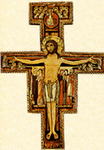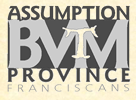 The celebration of Passover by the Jewish community today has its roots in biblical tradition. However, it is not the same celebration as was conducted by Jews at the time of the Roman occupation and the beginnings of Christianity. It reflects more of a Medieval influence.
The celebration of Passover by the Jewish community today has its roots in biblical tradition. However, it is not the same celebration as was conducted by Jews at the time of the Roman occupation and the beginnings of Christianity. It reflects more of a Medieval influence.
Nevertheless, the Haggadah (Hebrew -- story) is the same, namely, God delivered the Hebrew slaves from Egyptian bondage and formed them as his Chosen People in the Sinai Desert and gave them the Torah (Hebrew -- law) through the hands of Moses at Mount Sinai.
The celebration of the the Passover is conducted as a supper and there is a seder (Hebrew -- order) to the meal and all that occurs. It is a home liturgy. The basic contents of the celebration are the meal and the story. This is accompanied by the praying of Psalms, especially Psalms 118, 135 and 136 which render thanks to God for his enduring mercy and recount Israel's liberation from slavery.
The Haggadah text on the right (Hebrew letters for Haggadah), and because Hebrew is written from right to left, the book begins from the right end rather than the left.
The traditional principal foods at the time of Jesus would have been the Passover lamb as cental, the unleavened bread, or matzoh and grape wine. The lamb was likely made into a stew to accommodate as many people as possible for the feast.
The Passover lambs were slaughtered by the priests in the Temple in Jerusalem on the day before the feast began, according to custom, and had to be completed before nightfall. In Hebrew usage, the following day begins at sunset.
By the Middle Ages, perhaps before, the Jewish community ceased using lamb for the Passover meal because in the year AD 70, to quell the Jewish Revolt, the Romans destroyed Jerusalem and razed the Temple. The current edifice, the Dome of the Rock -- or Noble Sanctuary -- the third holiest shrine in Islam, is situated on the grounds where the Jewish Temples were once located.
 The Old City of Jerusalem as seen from the Mount of Olives with the Dome o f the Rock (or Noble Sanctuary) to the right, where the ancient Jewish Temples once stood. The Russian Orthodox Monastery of St. Mary Magdelene in in the foreground.
The Old City of Jerusalem as seen from the Mount of Olives with the Dome o f the Rock (or Noble Sanctuary) to the right, where the ancient Jewish Temples once stood. The Russian Orthodox Monastery of St. Mary Magdelene in in the foreground.
The Jewish Passover now uses a chicken in lieu of the lamb -- there is no Temple at which to sacrifice the lambs and there are no priests to conduct the ritual slaughters. It is a tribute of sacred -- and sad -- memory on behalf of the Jewish community to honor these events in such a manner. They maintain the ancient biblical mandate to keep the Passover, but historical realities have caused a reinterpretation by the rabbis as to how it is to be celebrated.
However, the shank bone of the lamb, in honor of the ancient past, is kept on the seder plate as a reminder of how the celebration was once done and is also a reminder of the hope for a renewed celebration of Pesach in the holy city of Jerusalem. Toward the end of the meal the participants cry out, Lashanah haba b'Yerushalayim! Next year in Jersualem!
Jesus, being Jewish and a rabbi, along with his Apostles, disciples and family would have been very famliar with the customs of his day, including the annual ritual slaughter of the Passover lambs in the Temple just prior to the celebration.
Compare the two separate traditions we have in the Gospels -- the Synoptic tradition (Mark, Matthew and Luke) have the Last Supper as their Passover meal while the Johannine tradition has Jesus die on the very day that the Passover lambs were being slaughtered, just before Passover actually begins.

The differences between the traditions are theological. They do not contradict the foundations of Jesus' Passion, death and resurrecton on the Third Day, nor do they deny the Holy Eucharist. John's tradition places this teaching within the Bread of Life discourse in chapter 6 while the Synoptists place it at the Last Supper on the night before Jesus' death.
Byzanitne icon of "The Mystical Supper" of Jesus with the Apostles on Holy Thursday
For us Christians the Eucharist is the New Passover, the universal Passover. What God instituted through Moses for Israel to commemorate annually the great events of the Exodus foreshadowed the deliverance God would accomplish for all humanity through Jesus Christ who was obedient to death, even death on a Cross (cf. Phil. 2:6-11).
The Mass or Divine Liturgy, then, is our seder meal; the Eucharist is our celebration -- not just annually but weekly on Sundays and even daily -- of the saving events that have brought about the gift of salvation for the whole human race. Our haggadah is the institution narrative we hear at every Celebration of the Eucharist when we believe that the simple bread and wine is transformed by the power of God's Spirit through our recounting of the event and words of the Lord Jesus into the very Body and Blood, Soul and Divinity of our Savior.
Jesus himself is our Passover; he is the Paschal Lamb! He is our
Pesach. Is this not what we hear in the Roman Rite before approaching the altar for Holy Communion? The priest, addressing the assembly, cries out,
"This is the Lamb of God who takes away the sins of the world . . ." to which we respond,
"Lord, I am not worthy to receive you, but only say the word and I shall be healed!"
We properly honor our "elder brothers (and sisters)" as Pope John Paul II was wont to call the Jewish community in their annual celebration of God's great saving event in the formation of the House of Israel -- the Exodus. That is part of our heritage as Christians. Let us remember our Jewish brothers and sisters, then, as we celebrate the seder and recount the haggadah of our salvation in Christ this Holy Week and especially the Sacred Triduum, the Great Passover of the Son of the God of Israel.
 ese curse puts it. Just read today that a huge section of the Anarctic ice shelf is breaking off leaving the glaciers more exposed to the ocean, which can increase their melting speed. As of today almost 170 people have died in Mexico due to the so-called "swine flu." The economic stimulus seems sluggish and US auto makers are in a very bad way. And Somali pirates in the Indian Ocean and Taliban militants in Pakistan and Afghanistan are upping the violence, plus the sectarian inter-Muslim violence spree in Baghdad, Iraq has taken scores of lives.
ese curse puts it. Just read today that a huge section of the Anarctic ice shelf is breaking off leaving the glaciers more exposed to the ocean, which can increase their melting speed. As of today almost 170 people have died in Mexico due to the so-called "swine flu." The economic stimulus seems sluggish and US auto makers are in a very bad way. And Somali pirates in the Indian Ocean and Taliban militants in Pakistan and Afghanistan are upping the violence, plus the sectarian inter-Muslim violence spree in Baghdad, Iraq has taken scores of lives.















 The differences between the traditions are theological. They do not contradict the foundations of Jesus' Passion, death and resurrecton on the Third Day, nor do they deny the Holy Eucharist. John's tradition places this teaching within the Bread of Life discourse in chapter 6 while the Synoptists place it at the Last Supper on the night before Jesus' death.
The differences between the traditions are theological. They do not contradict the foundations of Jesus' Passion, death and resurrecton on the Third Day, nor do they deny the Holy Eucharist. John's tradition places this teaching within the Bread of Life discourse in chapter 6 while the Synoptists place it at the Last Supper on the night before Jesus' death.




























